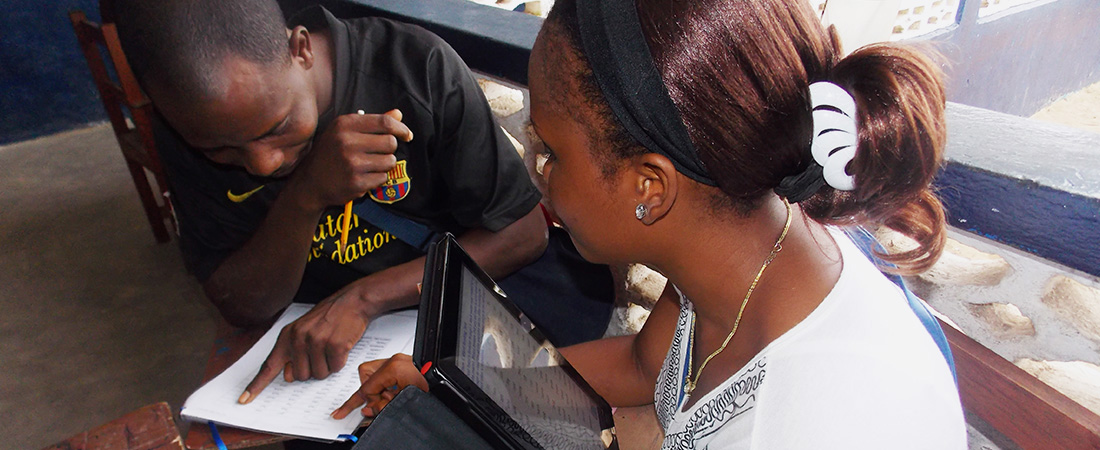Getting a Read on Youth and Adult Literacy

OLA (Out of School Youth Literacy Assessment) tool being administered.
Teaching literacy is difficult in war-torn, impoverished countries such as Liberia, where an alarming number of youth dropped out of school before grade three—or never attended school at all. But improving literacy among those who missed the chance to learn to read and write early on can be a critical part of improving their abilities to earn a sustainable livelihood.
EDC is working with the ministries of education in Liberia and other African countries to help them ensure that literacy programs reach out-of-school youth (ages 13 to 35) and other young adults who are motivated to learn. To make sure youth and adult students get the right level of instruction and make progress in literacy programs such as this, EDC has developed the Out of School Literacy Assessment (OLA), part of EDC’s growing portfolio of literacy assessment tools.
OLA is designed for out-of-school youth and adults whose learning needs are different from those of young children attending primary grades. It is in the process of being validated in three countries, including Liberia, where an EDC-implemented project, USAID Advancing Youth, offers evening classes in alternative basic education for young people who want to learn basic literacy, numeracy, and life and work skills. Advancing Youth’s curriculum combines literacy and work readiness skills development using texts drawn from or about daily life and work in Liberia to develop the basic skills learners need to strengthen their livelihoods or find formal employment.
OLA measures the same basic reading skills found in other reading assessments, such as naming letters in the alphabet, producing the letter sounds or syllables, and reading words and simple texts; however, it also includes functional literacy items and more emphasis on comprehension skills. OLA tests oral reading levels using real-life items such as street signs and medicine bottles, as opposed to focusing on storytelling narratives such as those used in early reading classrooms.
“What’s different about OLA is that it’s heavily oriented toward real-life literacy tasks,” says EDC’s Brenda Bell, an international adult literacy expert.
When assessing literacy among out-of-school youth and adults, it’s critical to examine the ways in which they’ve adapted despite their low literacy skills, says Bell. A young adult may not know how to read the word “rice” but knows how to identify the word on a bag of rice.
“Most basic reading assessments don’t take into consideration an adult’s life experience, the ways they’ve learned to navigate through life, and how they’ve learned to be responsible and make decisions,” says Bell. “So we decided to create an assessment that starts to capture some of that.”
“We have designed OLA so that it can be modified for different alphabetic languages and their cultures,” says EDC’s John Strucker, a literacy assessment expert. “The basic alphabetics, word reading, and oral reading and comprehension items may be similar across languages, but the real-life literacy items will vary according to the country context.”
In addition, says Strucker, the word reading portion of OLA has two unique attributes: it’s fairly easy to produce for various languages, and it uses a sample of words (from easy to more difficult) drawn from materials that learners actually use in their literacy programs.
OLA has been programmed for electronic administration to reduce data processing time and to allow technical teams greater access to the data as it is collected. This electronic platform, eOLA, is similar to eEGRA, EDC’s electronic version of the Early Grade Reading Assessment, which is used internationally to measure children’s reading levels.
OLA may be used to assess students’ progress, provide feedback to teachers and administrators, and report on literacy gains to ministries of education and donors. EDC is gathering OLA data to build a body of knowledge about the reading and writing skills of youth and young adult learners across multiple countries and projects.
Accurate reading assessments provided by the OLA tool will help schools and teachers ensure their literacy students are making real progress—and are on the road to better lives.